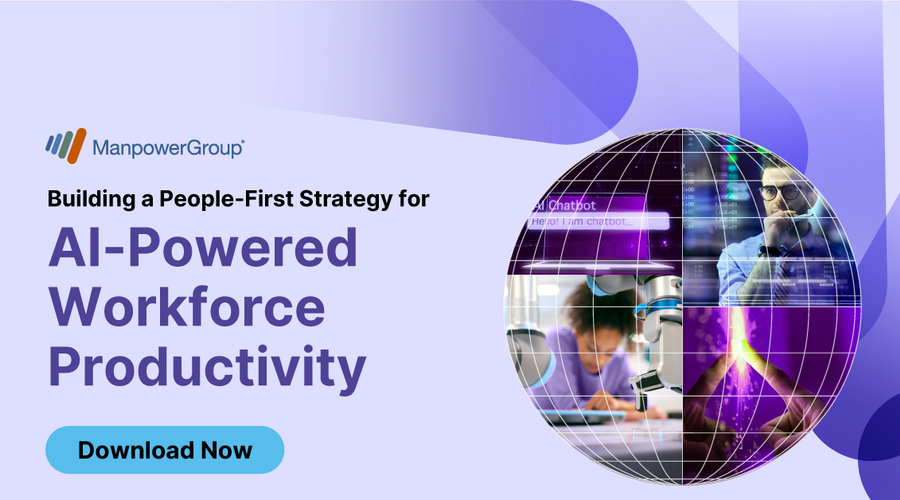This report aims to demystify Artificial Intelligence (AI) for workers and employers by exploring the state of AI adoption at work, sentiments around it, and opportunities for bridging AI and tech skill gaps. Jump to full report.
Key findings:
According to ManpowerGroup’s Q3 2024 Employment Outlook Survey, more than half of global large enterprises with more than 5,000 employees (52%) are currently using AI.
Across industries and global regions, survey respondents believe AI-based technologies will positively impact business performance and employee training, recruiting, onboarding, engagement, and diversity.
Within the next few years, AI-based technologies are likely to be deployed in global workforces in a variety of ways, including objective performance analysis, customized skill building, and autonomous AI assistants.
By 2030, the capabilities of AI and automation in the workforce will complete the shift from task-specific applications to interconnected agents with more sweeping responsibilities and increasing power. However, the speed of adoption en masse depends on factors such as regulatory and ethical environment.
To build a people-first AI strategy, choose implementations that make sense for your business and select appropriate partners.
Since ChatGPT was introduced to the market in late 2022, generative AI offerings are progressing at a rapid pace. Generative AI can generate text, images, or other media by learning the patterns and structure of input training data and delivering new data with similar characteristics.
The development of generative AI is a logical linear progression from the chatbots of the 2000s and 2010s. In the coming years, we will see generative AI use cases emerging across all industries, AI democratization expanding accessibility and impact among our workforces, and far greater integration into both major and minor aspects of traditionally human roles.
Furthermore, generative AI isn’t the only game in town. Advanced automation and talent intelligence are critical AI-based technologies in the market today that have the potential to transform the way we work.
However, none of this should be alarming. The development and deployment of artificial general intelligence – i.e. technology that can teach itself without human input, with the ability to do most cognitive tasks as well as, or better than humans – is still a distant reality.
In their current state, AI-based technologies aimed at workforce operations still require substantial human oversight, and most organizations are deciding in real time how to use AI effectively for many business purposes and problems.
This report provides a snapshot of the current state of AI integration, as well as forecasts about the value new AI-based technologies are likely to bring to workforce operations and human resources by 2030 and beyond.
Full Report

